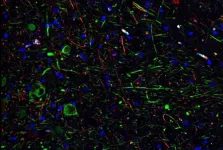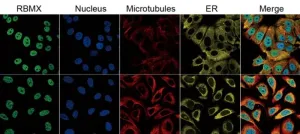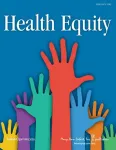(Press-News.org) A new study reported that SARS-CoV-2, the virus that causes COVID, can infect dopamine neurons in the brain and trigger senescence—when a cell loses the ability to grow and divide. The researchers from Weill Cornell Medicine, Memorial Sloan Kettering Cancer Center and Columbia University Vagelos College of Physicians and Surgeons suggest that further research on this finding may shed light on the neurological symptoms associated with long COVID such as brain fog, lethargy and depression.
The findings, published in Cell Stem Cell on Jan. 17, show that dopamine neurons infected with SARS-CoV-2 stop working and send out chemical signals that cause inflammation. Normally, these neurons produce dopamine, a neurotransmitter that plays a role in feelings of pleasure, motivation, memory, sleep and movement. Damage to these neurons is also connected to Parkinson’s disease.
“This project started out to investigate how various types of cells in different organs respond to SARS-CoV-2 infection. We tested lung cells, heart cells, pancreatic beta cells, but the senescence pathway is only activated in dopamine neurons,” said senior author Dr. Shuibing Chen, director of the Center for Genomic Health, the Kilts Family Professor Surgery and a member of the Hartman Institute for Therapeutic Organ Regeneration at Weill Cornell Medicine. "This was a completely unexpected result.”
Determining How SARS-CoV-2 Impacts Different Cells
Previously, Dr. Chen led the effort to generate multiple cell types from human stem cells and tested them to see which ones SARS-CoV-2 could infect. This allowed the researchers to survey the spectrum of tissues that might be infected during COVID, which has a diverse array of symptoms in different patients. They also studied autopsy samples from patients infected with the virus to confirm their observations from the lab grown cells.
Surprisingly, they found that a small percentage of dopamine neurons exposed to SARS-CoV-2 were infected, approximately five percent. “The infection rate of dopamine neurons isn’t as high as lung cells, the virus’s main target, but even a small population of infected cells can potentially have a severe effect,” said Dr. Chen.
Interestingly, not all neuronal cell types were vulnerable to viral infection. The researchers observed that cortical neurons were not permissive to SARS-CoV-2 infection under identical experimental conditions.
Protecting Dopamine Neurons
In this paper, the researchers used transcriptional profiling to identify how SARS-CoV-2 infection modified gene activity and the resulting changes in the way cells behaved. “We discovered that only dopamine cells had the senescence pathway activated,” said Dr. Chen. In stark contrast, the genes in the senescence pathway were not significantly turned on with SARS-CoV-2 infected lung organoids, pancreatic cells, liver organoids or heart cells.
The researchers found that the gene signatures—the unique pattern of gene activity—from the infected lab-grown dopamine neurons and the dopamine neurons from COVID autopsy samples were the same. This included genes that triggered chemical signals for inflammation.
Next, they looked for ways to protect the neurons to reduce the risk of neurological defects when a patient is infected by the virus.
The researchers tested drugs already marketed for various conditions to find one that either prevented SARS-CoV-2 infection or rescued infected dopamine neurons from senescence. The screen identified three drugs that blocked SARS-CoV-2 infection thereby preventing the dopamine cells from senescence: riluzole (treats ALS or Lou Gehrig’s disease), metformin (treats diabetes) and imatinib (treats cancer). Further study on these drugs may lead to a way to prevent the virus’s attack on the brain.
Though most people are exposed to COVID, only certain individuals will be impacted since many factors are involved in the risk for neurological symptoms including severity of the disease and genetics. Human population studies are exploring this aspect further.
While the clinical relevance of these findings is still unclear, since dopamine neuron senescence is a hallmark of Parkinson’s disease the researchers suggest that long COVID patients should be monitored for an increased risk of developing Parkinson’s-related symptoms. To date Parkinson’s symptoms have not been overly reported in population studies.
This study was a collaboration with Dr. Lorenz Studer, director of the Center for Stem Cell Biology at Memorial Sloan Kettering Cancer Center; Dr. David D. Ho, Clyde '56 and Helen Wu Professor of Medicine at Columbia University Vagelos College of Physicians and Surgeons; and Dr. Robert Schwartz, associate professor of medicine in the Division of Gastroenterology and Hepatology, a member of the Sandra and Edward Meyer Cancer Center at Weill Cornell Medicine and a hepatologist at NewYork-Presbyterian/Weill Cornell Medical Center.
END
SARS-CoV-2 can infect dopamine neurons causing senescence
2024-01-17
ELSE PRESS RELEASES FROM THIS DATE:
The metalens meets the stars
2024-01-17
Metalenses have been used to image microscopic features of tissue and resolve details smaller than a wavelength of light. Now they are going bigger.
Researchers at the Harvard John A. Paulson School of Engineering and Applied Sciences (SEAS) have developed a 10-centimeter-diameter glass metalens that can image the sun, the moon and distant nebulae with high resolution. It is the first all-glass, large-scale metalens in the visible wavelength that can be mass produced using conventional CMOS fabrication technology.
The ...
New U of A-based study to examine very rare adverse events linked to COVID-19 vaccines
2024-01-17
EDMONTON — A University of Alberta professor is co-leading a new international vaccine safety network to examine why some people who received a COVID-19 vaccine experienced very rare adverse events associated with the vaccine.
The International Network of Special Immunization Services (INSIS), based at the U of A, is a consortium of academic medical centres around the world coming together to study very rare adverse events after vaccination. An adverse reaction is considered very rare when it affects less than .001 per cent of the population.
“The bar for safety with vaccines is very high because we’re giving them ...
$24 million grant to extend Study of Healthy Aging in African Americans (STAR)
2024-01-17
Researchers at UC Davis Health and Kaiser Permanente Division of Research have received a $24 million grant from the National Institute on Aging, part of the National Institutes of Health (NIH), to continue the Study of Healthy Aging in African Americans (STAR) for an additional five years.
STAR, which launched in 2017, follows a group of approximately 750 older adults to understand how behaviors and lifestyle may increase the risk of Alzheimer’s disease and related dementias for Black and African Americans. The study ...
Metastatic breast cancer treatments have aided decline in deaths, Stanford Medicine-led study finds
2024-01-17
Deaths from breast cancer dropped 58% between 1975 and 2019 due to a combination of screening mammography and improvements in treatment, according to a new multicenter study led by Stanford Medicine clinicians and biomedical data scientists.
Nearly one-third of the decrease (29%) is due to advances in treating metastatic breast cancer —a form that has spread to other areas of in the body and is known as stage 4 breast cancer or recurrent cancer. Although these advanced cancers are not considered curable, women with metastatic disease are living longer than ever.
The analysis helps cancer researchers assess where to focus future efforts and resources.
“We’ve ...
Aberrant RBMX expression relevant for cancer prognosis and immunotherapy response
2024-01-17
“In the future, targeting of RBMX may be a novel method in cancer therapy.”
BUFFALO, NY- January 17, 2024 – A new research paper was published in Aging (listed by MEDLINE/PubMed as "Aging (Albany NY)" and "Aging-US" by Web of Science) Volume 16, Issue 1, entitled, “Aberrant RBMX expression is relevant for cancer prognosis and immunotherapy response.”
Cancer accounts for the highest rates of morbidity and mortality worldwide. RNA binding motif protein X-linked (RBMX) is a nuclear ...
Higher measurement accuracy opens new window to the quantum world
2024-01-17
A team at HZB has developed a new measurement method that, for the first time, accurately detects tiny temperature differences in the range of 100 microkelvin in the thermal Hall effect. Previously, these temperature differences could not be measured quantitatively due to thermal noise. Using the well-known terbium titanate as an example, the team demonstrated that the method delivers highly reliable results. The thermal Hall effect provides information about coherent multi-particle states in quantum materials, based on their interaction with lattice vibrations (phonons).
The laws of quantum physics apply to all materials. However, in so-called ...
National collaborative for health equity roundtable: a call for unity and the power of racial healing
2024-01-17
A new Roundtable discussion in the peer-reviewed journal Health Equity explores the results of a poll conducted by the National Collaborative for Health Equity (NCHE), called the “Heart of America Annual Survey.” The survey found that more than 80% of respondents want a national leader that unifies rather than divides us, suggesting that there is a readiness in the country to put polarization and division behind us so that we can solve our collective and common challenges and problems. Click here to read the Roundtable now.
Moderating ...
New project to improve modeling of climate change
2024-01-17
Jingrui He, professor of information sciences at the University of Illinois Urbana-Champaign, has been awarded a two-year, $600,000 grant from the IBM-Illinois Discovery Accelerator Institute to improve modeling climate change and its impact across multiple application domains. He and a team of researchers from the University of Illinois and IBM will build Climate Runtime, a computational framework integrating cutting-edge capabilities from climate foundation models and multimodal fusion. This framework will allow for accurate prediction and quantification of weather and climate events and their impact in areas such as finance ...
Climate change isn’t producing expected increase in atmospheric moisture over dry regions
2024-01-17
Contacts:
David Hosansky, UCAR and NSF NCAR Manager of Media Relations
hosansky@ucar.edu
720-470-2073
Audrey Merket, UCAR and NSF NCAR Science Writer and Public Information Officer
amerket@ucar.edu
303-497-8293
The laws of thermodynamics dictate that a warmer atmosphere can hold more water vapor, but new research has found that atmospheric moisture has not increased as expected over arid and semi-arid regions of the world as the climate has warmed.
The findings are particularly puzzling because climate models have been predicting ...
New research highlights unprecedented targeted approach to treating triple-negative breast cancer
2024-01-17
Cleveland Clinic researchers have successfully developed a therapeutic peptide that blocks aggressive cancer cells from multiplying rapidly. The results highlight a potential new strategy for developing targeted treatments for triple-negative breast cancer, which currently has no approved options.
Targeted drugs attack cancer cell functions directly, offering a more precise approach to complement broader treatments like chemotherapy. A research team led by Ofer Reizes, PhD, and Justin Lathia, PhD, designed a peptide therapeutic that disrupts the molecular processes behind aggressive cancer growth when delivered into cells.
The ...







